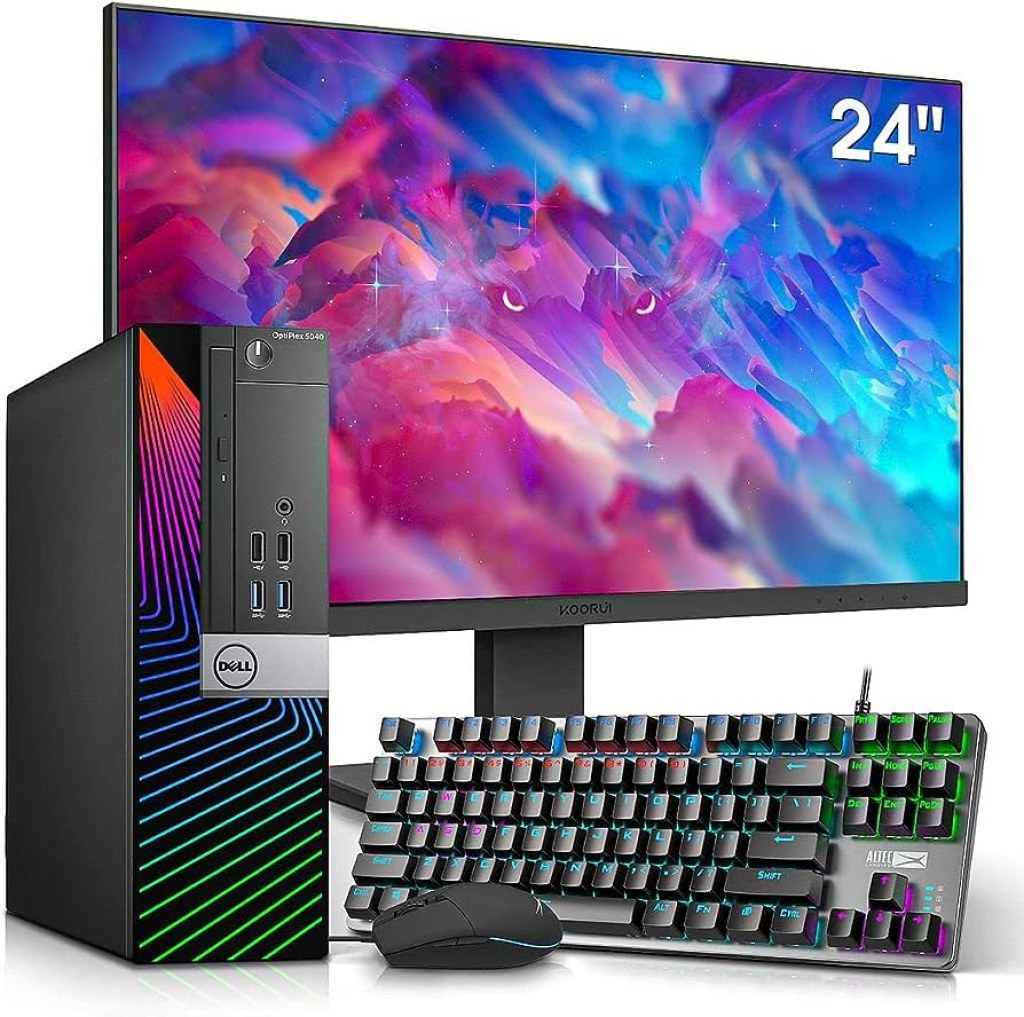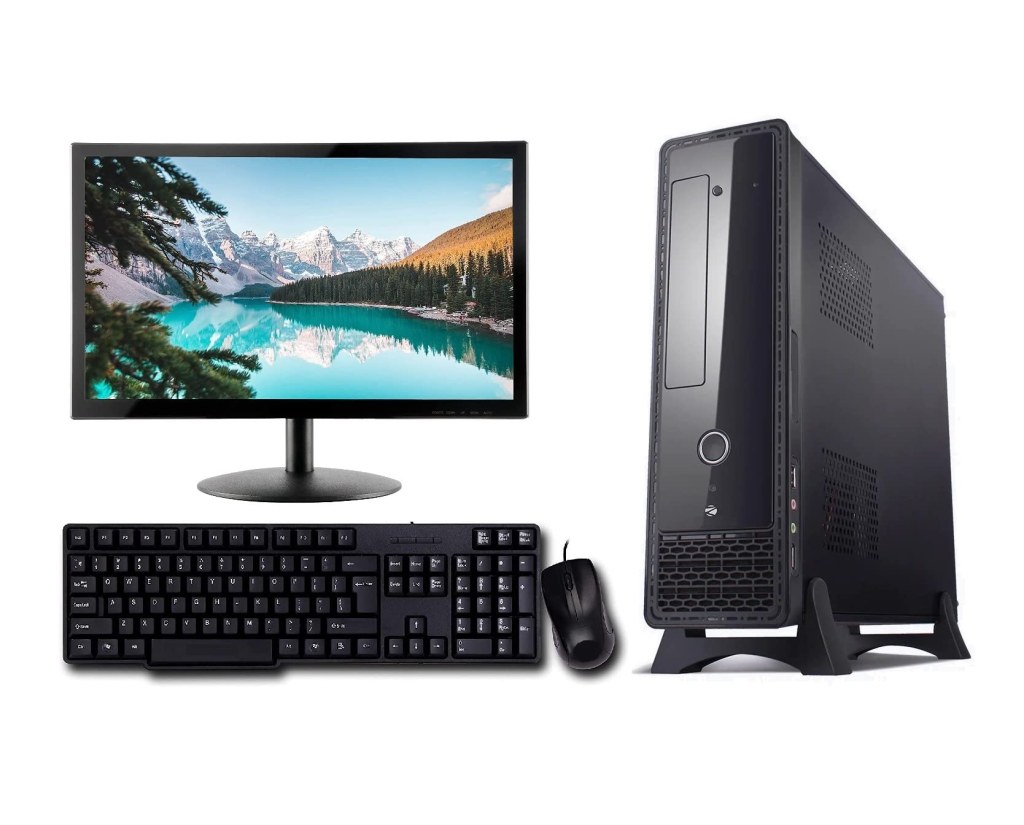Desktop Computer You
Introduction
Hello, Readers! Welcome to our comprehensive guide on the Desktop Computer You. In this article, we will delve into the world of desktop computers, exploring their features, advantages, and disadvantages. Whether you’re a professional, a student, or a gaming enthusiast, understanding the ins and outs of desktop computers is crucial in making an informed purchasing decision. So, let’s dive in and explore the fascinating world of desktop computers together.
Before we start, let’s define what a desktop computer is. A desktop computer, also known as a personal computer (PC), is a stationary computing device that consists of a central processing unit (CPU), monitor, keyboard, mouse, and other peripherals. Unlike laptops, desktop computers are not portable and are designed to be used in a fixed location, such as an office or home workspace.

Image Source: media-amazon.com
Now that we have a basic understanding of what a desktop computer is, let’s explore its various components, features, and functionalities.
But before that, let’s take a look at the table below for a complete overview of the desktop computer you:
Component
Description
CPU
The central processing unit, also known as the brain of the computer, carries out instructions and performs calculations.

Image Source: media-amazon.com
Monitor
The display screen that allows users to view and interact with the computer’s output.
Keyboard
An input device that allows users to input text and commands into the computer.
Mouse
An input device that enables users to navigate and interact with graphical user interfaces.
Peripherals
Additional devices such as printers, scanners, and speakers that enhance the computer’s functionality.
What is a Desktop Computer?
Now that we have a basic understanding of what a desktop computer is, let’s delve deeper into its various components and functionalities.
A desktop computer consists of a central processing unit (CPU), monitor, keyboard, mouse, and other peripherals. The CPU is the brain of the computer, responsible for carrying out instructions and performing calculations. The monitor is the display screen that allows users to view and interact with the computer’s output. The keyboard is an input device that enables users to input text and commands into the computer, while the mouse enables users to navigate and interact with graphical user interfaces.
In addition to these core components, desktop computers can be further enhanced with peripherals such as printers, scanners, and speakers, which expand the computer’s functionality and allow users to perform various tasks.
Desktop computers come in various sizes and configurations, catering to different needs and requirements. Whether you’re a professional in need of a high-performance workstation, a student requiring a reliable machine for studying and research, or a gaming enthusiast seeking top-notch graphics and processing power, there’s a desktop computer out there that fits your needs.
Now that we have a basic understanding of what a desktop computer is and its various components, let’s explore who can benefit from using a desktop computer.
Who Can Benefit from Using a Desktop Computer?
Desktop computers offer a wide range of benefits and are suitable for various individuals and professions.
Professionals, such as graphic designers, video editors, and architects, can greatly benefit from using desktop computers. These machines offer powerful processing capabilities, allowing professionals to run resource-intensive software and perform complex tasks with ease. The large display screens of desktop computers also provide professionals with ample space to work on detailed projects and multitask efficiently.
Students can also benefit from using desktop computers for their academic pursuits. These machines provide a reliable and dedicated workspace for studying, researching, and completing assignments. The larger screens and ergonomic keyboards of desktop computers enhance productivity and comfort during long study sessions.
Gaming enthusiasts are another group that can benefit from desktop computers. These machines offer superior graphics, processing power, and customization options, providing an immersive gaming experience. Desktop computers allow gamers to play the latest releases at high resolutions and frame rates, giving them a competitive edge in the gaming world.
Now that we’ve explored who can benefit from using a desktop computer, let’s move on to discussing when desktop computers were first introduced.
When Were Desktop Computers First Introduced?
The history of desktop computers dates back to the 1970s when personal computers started gaining popularity. One of the first commercially successful desktop computers was the Commodore PET, released in 1977. This machine featured an integrated keyboard, monitor, and cassette tape drive, making it a self-contained computing device.
Over the years, desktop computers have evolved significantly in terms of design, performance, and functionality. Advancements in technology have led to the introduction of more compact and powerful desktop computers, catering to the ever-changing needs of users.
Now that we know when desktop computers were first introduced, let’s explore where you can purchase these machines.
Where Can You Purchase Desktop Computers?
Desktop computers can be purchased from various sources, both online and offline.
Online retailers such as Amazon, Newegg, and Best Buy offer a wide range of desktop computers from various brands and configurations. These platforms provide detailed product descriptions, customer reviews, and ratings, making it easier for users to compare and choose the right desktop computer for their needs.
Brick-and-mortar stores, such as electronics retailers and computer specialty shops, also offer desktop computers. These stores provide the advantage of seeing and experiencing the computers in person before making a purchase, allowing users to get a feel for the machine’s build quality and usability.
Now that we’ve discussed where you can purchase desktop computers, let’s move on to the reasons why you should consider investing in one.
Why Should You Consider Investing in a Desktop Computer?
Desktop computers offer numerous advantages that make them a worthy investment.
Firstly, desktop computers provide superior performance compared to laptops. The larger form factor allows for more powerful components, such as high-performance processors, dedicated graphics cards, and ample storage space. This makes desktop computers ideal for resource-intensive tasks such as gaming, video editing, and 3D rendering.
Secondly, desktop computers offer better ergonomics compared to laptops. The larger screens and ergonomic keyboards of desktop computers promote better posture and reduce the risk of musculoskeletal issues associated with prolonged computer use. This is particularly important for professionals and students who spend extended periods in front of the computer.
Thirdly, desktop computers are more easily upgradeable and customizable compared to laptops. Users can easily swap out components such as the CPU, graphics card, and storage to keep up with the latest technological advancements and tailor the machine to their specific needs.
However, it’s important to consider the disadvantages or potential drawbacks of desktop computers before making a purchase decision.
Now that we’ve explored the advantages and disadvantages of desktop computers, let’s move on to answering some frequently asked questions.
Frequently Asked Questions (FAQs)
1. Can I use a desktop computer for gaming?
Yes, desktop computers are highly suitable for gaming. They offer superior graphics, processing power, and customization options, providing an optimal gaming experience.
2. Are desktop computers more expensive than laptops?
Desktop computers can be more expensive than laptops, especially when considering high-performance configurations. However, they offer better performance and customization options, making them a worthwhile investment for certain use cases.
3. Can I upgrade the components of a desktop computer?
Yes, desktop computers are easily upgradeable. Users can swap out components such as the CPU, graphics card, and storage to keep up with the latest technological advancements.
4. Are desktop computers suitable for professionals?
Yes, desktop computers are highly suitable for professionals, especially those in fields such as graphic design, video editing, and architecture. These machines offer powerful processing capabilities and ample screen space for detailed work.
5. Can I connect multiple monitors to a desktop computer?
Yes, desktop computers can support multiple monitors, allowing for increased productivity and multitasking.
Conclusion
In conclusion, desktop computers are versatile machines that offer superior performance, customization options, and ergonomic benefits. Whether you’re a professional, a student, or a gaming enthusiast, a desktop computer can greatly enhance your computing experience and productivity.
Remember to consider your specific needs and requirements when choosing a desktop computer, and ensure that the machine’s specifications align with the tasks you’ll be performing. Whether you’re tackling resource-intensive tasks, immersing yourself in the latest games, or simply looking for a reliable and ergonomic workspace, a desktop computer can be the perfect solution.
Final Remarks
Thank you for reading our comprehensive guide on the Desktop Computer You. We hope that this article has provided valuable insights into the world of desktop computers and helped you in making an informed purchasing decision. If you have any further questions or need assistance, feel free to reach out to us. Happy computing!